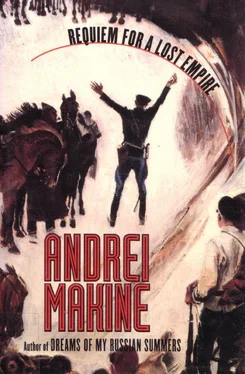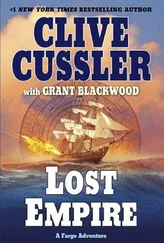He recounted this dream to Sasha, who still came to see them in Dolshanka, as in the old days.
A year and a half later, one fine morning in June, Nikolai was returning from the town on horseback. The sun was not yet risen and the forest beside which the road ran had the resonance of a vast, empty cathedral nave. The calls of the birds still had a muted, nocturnal sound. Before making his way up a sandy slope he turned aside, and went into the forest, searching for the place known only to himself. But more than twenty years later the glade of long ago was disappearing under a whole copse of aspen. He was about to rejoin the road when suddenly a thunder of hoofbeats arose. The noise was growing louder so rapidly that it could only be a horse ridden at full gallop. Nikolai tugged at the reins a little, and stationed himself behind a tree. A horseman appeared on the road. A soldier crouched over the mane of his horse, welded to it as if into a single dark arrow, streaking past the trunks of the birch trees. His face was frozen in a grimace, baring his teeth. "A madman," Nikolai said to himself, tossing his head. The dust swirled gently around the marks left by the flurry of hooves.
Passing through the village adjacent to Dolshanka, he noticed the simpleton sitting on a stack of felled pine trees. Several of the trunks had already been squared off, trickles of resin gleamed on their pink flesh, like drops of honey. The sight of this pale wood, ready to be erected into the wall of an izba , promised happiness. The simpleton was asleep, her mouth half open, as if she had some news to tell. Her hand, as she slept, continued to shuffle her glass treasures, scattered over the worn fabric of her dress.
On arrival at Dolshanka close to noon Nikolai saw a big crowd in front of the village soviet. The women were weeping, the men frowning, the children laughing and being cuffed. A voice repeated several times, mechanically, "Hitler, Hitler…" Others were saying, "The Germans." The war had just begun.
It seemed to him that there was no disruption in the sequence of days. Quite simply the normal routine of work in the fields now found correspondence in the parallel advance of the front line. The names of the fallen cities left him incredulous, these were already in the depths of Russia, where the presence of the Germans seemed like an optical illusion, a cartographical error. He remembered the films of the past few years: the enemy was always defeated close to the frontier. The songs he found himself humming promised, "Like Stalin, we'll confront the foe!"
Vitebsk, Chernigov, Smolensk…
One day even this bizarre topography disappeared. Cities were on the move, as if on a crumpled map. Routed Soviet soldiers fled through Dolshanka: the Germans had encircled several divisions. The village, surrounded, found itself on a strange territory located within the enemy army. The circle tightened, driving the villagers into the forest, then beyond the river all riddled with bullets, onto a charred wheatfield, and finally into the main street of the district capital, where there was still fighting. People stumbled about on this map that was being ripped apart under their feet, crumpled by tank tracks, pitted with explosions. With a rifle picked up close by a dead soldier Nikolai hid behind a fence observing the Germans' progress. They seemed not to notice the tremors of the map, advanced calmly, with precise and economical movements: a burst of gunfire, a house burned with a flamethrower, a tank clearing the street ahead of them.
He left his hiding place, the smoke from the blaze burned his eyes. A number of civilians ran across the road with a determined air. They must know the way out of the encircled town. He followed them as far as the long trains on the railroad sidings, near the station. One by one they dove under one train, then under another. When Nikolai climbed up from beneath the last train he just had time to catch sight of the German soldiers stationed at the bottom of the embankment, precisely where people were coming out. He did not feel the pain but had time to think of his son, already mobilized. "I must tell Pavel these people are machines." The soldiers kept firing, reloading, firing. If fugitives had continued to emerge from beneath the train these nine soldiers would have spent the rest of their lives killing them.
Pavel believed those minutes would continue ripping his sleep apart for long nights to come: the din of the caterpillar tracks a few inches above his head, the collapse of the trench he had fallen into when trying to get away ahead of the tanks. If he had not stumbled he would have continued running amid the breathless stampede and panic of the other soldiers. But he had slipped on a lump of clay, hurtled into a trench that was half dug and therefore quite shallow, had not had time to get up again. The roaring bulk had covered him with its shadow, the steel links of one track were hacking at the earth just above his face. For a moment he had felt as if he were being sucked into the entrails of the machine. The acid smell of the metal and the glaucous trail of the exhaust had filled his lungs. From beyond the trench cries and the crunch of bodies under the tank tracks could be heard through the throbbing of the engines.
That night, slumped down in a fir copse among some survivors from his company, he lay in wait for the return of those seconds spent under the tank. He fell asleep but the dream went off on a tangent, pushed open a secret door, translated everything into its own language, at the same time precise and oblique. Instead of tanks, a gigantic brand new machine tool with nickel-plated screws and levers covered in oil and grease. Its bowels vibrate with a rhythmic sound and disgorge punched disks at regular intervals. You have to slip your hand very nimbly into the coming and going of the mechanism and insert the steel plate into the press underneath the punch. And each time his hand goes in a little bit further, his body stretches up a little bit higher inside the machine, trying to avoid the rotation of the great cogwheels, the driving belts. Moreover the timing of the huge machine is not very well regulated. It is as if it senses the reaching out of the hand, the contortions of the body within its bowels. The fingers grasp a square of metal, the hand goes forward, the shoulder penetrates into the machine, the body worms its way in, edging between dozens of gears, crankshafts, cylinders. He manages to put the metal in place, withdraws his hand just before the punch comes down, and seeks to extricate himself. But all around him the machine is shuddering, without wasting a second, without the smallest opening via which he might reemerge. And through its noisy workings, he recognizes a room, light, and objects that come from his childhood.
The dream did not return on the nights that followed, for there were no nights. Always a flight toward the east, then an abandoned village that, during the brief hours of darkness, they attempted to transform into an entrenched camp. And in the morning, after disorderly resistance, a fresh retreat before the steady advance of the tanks and the German soldiers who smiled as they fired. The grinning of these men as they killed made a deeper impression on him than the tanks.
During those first weeks of the war he had to forget all he had learned during his military service. He still recalled the sergeant wetting his forefinger with saliva, raising it in the air to check the direction of the wind and explaining to them how much they needed to aim off. If anybody had spat on his finger to test the direction of the wind during these painful rearguard actions he would have been taken for a madman. The Germans fired their submachine guns and smiled. They responded with jerky small-arms fire from bolt-action rifles, often their only weapon at the start of the war. And they retreated, without being able to retrieve their wounded, without remembering the names of the villages surrendered. It seemed to him that he and his comrades in arms were fighting in a battle from one of his father's stories; their old-fashioned rifles, their troops of cavalry. On the opposing side quite a different war was being waged-a rapid sweep of armored vehicles across land turned upside down by aerial bombardment. Perhaps the Germans smiled when they saw the sabers flashing above the horses, as one smiles at the passing of an automobile several decades old, one that quaintly recalls a bygone age.
Читать дальше










